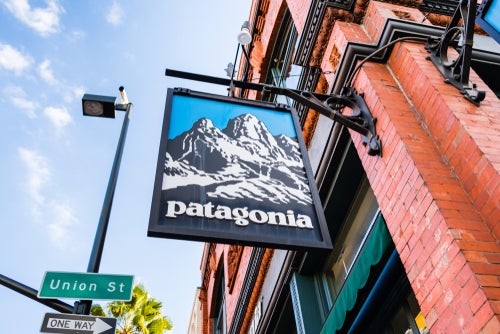
Outdoor apparel brand and certified B-Corp, Patagonia, announced yesterday (14 September) that earth is now the company’s only shareholder and the profits made each year will be used to help fight the climate crisis.
The company’s founder Yvon Chouinard explains: “While we’re doing our best to address the environmental crisis, it’s not enough. We need to find a way to put more money into fighting the crisis while keeping the company’s values intact.”
From now on 100% of the company’s voting stock transfers to the Patagonia Purpose Trust, which was created to protect the company’s values. All of the nonvoting stock has been given to the Holdfast Collective, a nonprofit dedicated to fighting the environmental crisis and defending nature with the funding coming from Patagonia.
Chouinard says: “Each year, the money we make after reinvesting in the business will be distributed as a dividend to help fight the crisis.”
According to the BBC this could amount to around US$100m a year, depending on the health of the company.
The company is well-known for being an innovator in terms of sustainability and GlobalData’s associate apparel analyst, Louise Deglise-Favre, tells Just Style exclusively Patagonia has been showing up the rest of the apparel sector for years.

US Tariffs are shifting - will you react or anticipate?
Don’t let policy changes catch you off guard. Stay proactive with real-time data and expert analysis.
By GlobalDataIt’s always strived to use materials that cause less harm to the environment, it gives away 1% of sales each year to grassroots environmental nonprofits and is a certified B Corp and California benefit corporation. Plus, in 2018 Patagonia changed the company’s purpose to: “We’re in business to save our home planet”.
Deglise-Favre believes this latest move is a big one but a good one and explains: “It completely makes sense for the ethos of the brand as it’s always stood for protecting the planet and operating in an ethical and sustainable way.”
She’s unsure as to why Patagonia has decided to take this step now but points out the company has had a lot of success in recent years and there’s always the risk that some will start to criticise so this decision shows its competitors, the wider apparel industry and indeed consumers that it’s not wishing to profit from its success and instead wants to live by its philosophy.
Deglise-Favre hopes Patagonia’s new strategy will inspire other businesses to do good and she predicts that its closest competitors – other outdoor-style brands that focus on nature could be inspired by the move. However, she adds: “It’s such a drastic move I don’t think there’s many brands that would take it to the same extent.”
Chouinard admits there were no good options available to take the next step, which is why the company decided to create its own. He explains: “One option was to sell Patagonia and donate all the money. But we couldn’t be sure a new owner would maintain our values or keep our team of people around the world employed.
“Another path was to take the company public. What a disaster that would have been. Even public companies with good intentions are under too much pressure to create short-term gain at the expense of long-term vitality and responsibility.”
He describes the decision as ‘going purpose’ as opposed to ‘going public’ as instead of extracting value from nature and transforming it into wealth for investors, the company will use the wealth Patagonia creates to protect the source of all wealth.
He’s also quick to highlight that the decision is not an excuse to ignore the real tension the company will continue to face between growth and the environmental impact of its operations. But, he says: “The new ownership structure provides a way to put the value that comes with responsible growth to work fighting the climate crisis”.
Last month Patagonia launched its first circular T-shirt using discarded tees and cotton scraps and earlier this year Patagonia scored 8.50 out of 10 in the Circular Fashion Index and was applauded for its equipment rental programme and use of recycled fabric.



